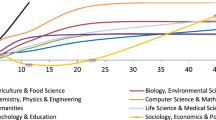Concluding remarks
This paper has reported evidence on the returns to legislating. In particular, we examined the distributional impact of a provision of Alabama's Code of Ethics which allows sitting state legislators to be on the payroll of public institutions of higher education. Using salary and educational budget data for 1987–88, we found that public funding per student for the junior and senior colleges in the state which employ legislators as educators is significantly higher than that received by comparable institutions.
Our empirical results suggest that Alabama's legislators selectively redistributed nearly $19 in available public education funds for every $1 received in outside earnings permitted by the state's code of ethics. The data thus imply that the brokerage fee assessed by legislators for redistributing wealth is on the order of 5% of the value of the transfer.
More importantly, our paper speaks to the importance of the relationship between legislative salaries, ethics laws, and the outside earnings of politicians. Because low wage pay for legislators lowers the returns to legislating on one margin, legislators will favor less stringent standards of ethical behavior that allow them to legitimately appropriate more of the value of legislation from outside sources. Pressure groups also benefit from a combination of low legislator salaries and loose ethical codes for politicians. When legislators collect a larger share of the returns to legislating in the form of outside earnings, they rationally devote more attention to special interests as opposed to taxpayer interests. They certainly appear to do so in the case of funding for higher education in Alabama.
Similar content being viewed by others
References
Alabama Commission on Higher Education. (1988) Unified budget recommendations. Montgomery, AL: Alabama Commission on Higher Education.
Alabama Commission on Higher Education. (1989). Statistical abstract: Higher education in Alabama, 1988–89. Montgomery, AL: Alabama Commission on Higher Education.
Barro, R.T. (1973). The control of politicians: An economic model. Public Choice 14 (Spring): 19–42.
Becker, G.S. and Stigler, G.J. (1974). Law enforcement, malfeasance, and compensation of enforcers. Journal of Legal Studies 3 (January): 1–18.
Council of State Governments. (1986). The book of the states, 1986–87 edition. Lexington, KY: Council of State Governments.
Faith, R.L., Leavens, D.R. and Tollison, R.D. (1982). Antitrust prok barrel. Journal of Law and Economics 15 (October): 329–342.
Galbraith, J.K. (1985). The affluent society. Boston: Houghton Mifflin.
Ireland, T.R. (1972). The politician's dilemma: What to represent. Public Choice 12 (Spring): 35–41.
Maloney, M.T., McCormick, R.E. and Tollison, R.D. (1984). Economic regulation, competitive governments, and specialized resources. Journal of Law and Economics 27 (October): 329–338.
McCormick, R.E. and Tollison, R.D. (1978). Legislatures as unions. Journal of Political Economy 86 (February): 63–78.
McCormick, R.E. and Tollison, R.D. (1981). Politicians, legislation, and the economy: An inquiry into the interest-group theory of government. Boston: Martinus Nijhoff.
Niskanen, W.A. (1971). Bureaucracy and representative government. Chicago: Aldine.
Peltzman, S. (1971). Pricing in public and private enterprises: Electric utilities in the United States. Journal of Law and Economics 14 (April): 109–147.
Peltzman, S. (1976). Toward a more general theory of regulation. Journal of Law and Economics 2 (August): 211–240.
Spiller, P.T. (1990). Politicians, interest groups, and regulators: A multiple-principals agency theory of regulation, or ‘Let them be bribed.’ Journal of Law and Economics 33 (April): 65–101.
Stigler, G.J. (1971). The theory of economic regulation. Bell Journal of Economics 2 (Spring): 3–21.
Stigler, G.J. (1976). The sizes of legislatures. Journal of Legal Studies 5 (January): 17–34.
Taylor, H.N. (1989). Double-dipping darlings of Goat Hill. Franklin County Times (18 June).
Author information
Authors and Affiliations
Additional information
We benefited from comments by Robert McCormick. Any remaining errors are our own.
Rights and permissions
About this article
Cite this article
Couch, J.F., Atkinson, K.E. & Shughart, W.F. Ethics laws and the outside earnings of politicians: The case of Alabama's “legislator-educators”. Public Choice 73, 135–145 (1992). https://doi.org/10.1007/BF00145088
Received:
Accepted:
Issue Date:
DOI: https://doi.org/10.1007/BF00145088




